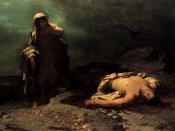"Creon. I have them laid out side by side. They are together at last, and at peace... Their work is done...
Chorus. Eurydice, the Queen, your wife--... When the Queen was told of her son's death, she waited carefully until she had finished her row, then put down her knitting calmly--as she did everything. She went up to her room... and there Creon, she cut her throat... Ant if it were not for that great red blot on the bed linen by her nick, one might think she was asleep.
Creon [in a dull voice]. She, too. They are all asleep [Pause.] It must be good to sleep.
Chorus. And now you are alone, Creon
Creon. Yes, all alone..."
A tragedy is a great loss (usually death) due to a flaw in a character's traits (especially in decision-making). It is not a very dramatic or spectacular death that gathers the attention of many people.
It is when a character is caught between a rock and a hard object. He/she has an obligation to do something. If that action is performed he/she will suffer greatly (or die). If the character doesn't perform the action, he/she will live the rest of his/her life in guilt.
In Creon's case, his character flaw is his desire for pure order. Ever since becoming King, he puts his kingdom above everything else, even his family. One of the reasons he takes on the responsibility of King is to restore order to Thebes. One way he does it is to bury Eteocles ("the prettier of the two corpses") and leave Polynices to rot. He then sets forth an edict allowing him to put to death anyone who attempts to bury Polynices. Ruling would be a lot easier if he had buried...



Good job
It is not bad but you should expand on some points. Why is the obligation so sacred? (explain family relations during the time of Sophocles.
0 out of 0 people found this comment useful.